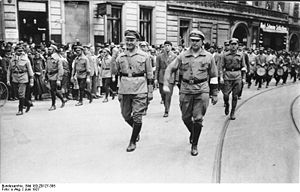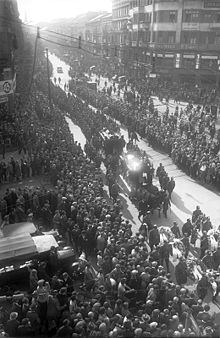- Max Matern
-
Max Matern (19 January 1902 – 22 May 1935) was a member of the Communist Party of Germany (KPD).
Max Matern was a communist storm trooper who was convicted of murder and executed for his involvement in the assassinations of Police Captains Paul Anlauf and Franz Lenck. The murders took place in 1931 at Bülow-Platz in Berlin. He was later glorified as a martyr by the KPD and East Germany's Socialist Unity Party of Germany (SED).
Contents
Early life
Max Matern was born in Berndshof near Ueckermünde and grew up in meager circumstances in Quitzdorf am See in eastern Saxony. He did an apprenticeship as a moulder in Torgelow and in 1925 moved to Berlin owing to the lack of jobs closer to home. There he found work as a member of the KPD's Parteiselbstschutz (Party Self Defense Unit). in which he demonstrated hard-line conviction and loyalty to the party.
 Communist leaders Ernst Thälmann (left) and Willy Leow (right) in front of parading troops of Rotfrontkämpferbund during their national meeting in Berlin, June 1927.
Communist leaders Ernst Thälmann (left) and Willy Leow (right) in front of parading troops of Rotfrontkämpferbund during their national meeting in Berlin, June 1927.
According to John Koehler,
Like their Nazi counterparts, the Selbstschutz men were thugs who served as bouncers at Party meetings and specialized in cracking heads during street battles with political enemies. Besides the Nazis, their arch foes included the Sozialdemokratische Partei Deutschlands (SPD) -- the Social Democratic Party of Germany -- and radical nationalist parties. They always carried a Stahlrute, two steel springs that telescoped into a tube seven inches long, which when extended became a deadly, fourteen inch weapon. Not to be outdone by the Nazis, these goons often were armed with pistols as well.[1]
The Murders
Main article: Assassination of Paul Anlauf and Franz LenckOn August 2, 1931, KPD Members of the Reichstag Heinz Neumann and Hans Kippenberger received a dressing down from Walter Ulbricht, the Party's leader in the Berlin-Brandenburg region. Enraged by police interference, Ulbricht snarled, "At home in Saxony we would have done something about the police a long time ago. Here in Berlin we will not fool around much longer. Soon we will hit the police in the head."[2]
Enraged by Ulrbicht's words, Kippenberger and Neumann decided to target Captain Paul Anlauf, the forty-two year old commander of the Seventh Precinct. Captain Anlauf, a widower with three daughters, had been nicknamed Schweinebacke, or "Pig Face" by the KPD. According to John Koehler,
Of all the policemen in strife-torn Berlin, the reds hated Anlauf the most. His precinct included the area around KPD headquarters, which made it the most dangerous in the city. The captain almost always led the riot squads that broke up illegal rallies of the Communist Party.[3]
On the morning of Sunday August 9, 1931, Kippenberger and Neumann gave a last briefing to the hit-team in a room at the Lassant beer hall. Mielke and Erich Ziemer were selected as the shooters. During the meeting, Matern gave a Luger pistol to a fellow lookout and said, "Now we're getting serious... We're going to give Schweinebacke something to remember us by."[4]
Kippenberger then asked Mielke and Ziemer, "Are you sure that you are ready to shoot Schweinebacke?"[5] Mielke responded that he had seen Captain Anlauf many times during police searches of Party Headquarters. Kippenberger then instructed them to wait at a nearby beer hall which would permit them to overlook the entire Bülow-Platz. He further reminded them that Captain Anlauf was accompanied everywhere by Senior Sergeant Max Willig, who the KPD had nicknamed, "Hussar."
Kippenberger concluded, "When you spot Schweinebacke and Hussar, you take care of them."[6] After the assassinations were completed, Mielke and Ziemer were informed that a diversion would assist in their escape. They were then to return to their homes and await further instructions.
That evening, Captain Anlauf was lured to Bülow-Platz by a violent rally demanding the dissolution of the Prussian Parliament. According to John Koehler,
As was often the case when it came to battling the dominant SPD, the KPD and the Nazis had combined forces during the pre-plebiscite campaign. At one point in this particular campaign, Nazi propaganda chief Joseph Goebbels even shared a speaker's platform with KPD agitator Walter Ulbricht. Both parties wanted the parliament dissolved because they were hoping that new elections would oust the SPD, the sworn enemy of all radicals. That fact explained why the atmosphere was particularly volatile this Sunday.[7]
At eight o'clock that evening, Mielke and Ziemer, spotted Captain Anlauf, Sergeant Willig, and Captain Franz Lenck walking in front of the Babylon Cinema, which was located at the corner of Bülowplatz and Kaiser-Wilhelm-Straße. As they reached the door of the movie house, the policemen heard someone scream, "Schweinebacke!"[8]
As Captain Anlauf turned towards the sound, Mielke and Ziemer opened fire at point blank range. Sergeant Willig was wounded in the left arm and the stomach. However, he managed to draw his Luger and fired a full clip at the assailants. Captain Franz Lenck was shot in the chest and fell dead in front of the entrance. Willig crawled over to Captain Anlauf, who had taken two bullets in the neck. As his life drained away, the Captain gasped, "Wiedersehen... Gruss..." ("So Long... Goodbye...")[9] Meanwhile, Matern, Mielke, Thunert, and Ziemer made their escape.
After it was revealed that Sergeant Willig had survived and could identify the assailants, Mielke and Ziemer were smuggled to the Soviet Union.
Arrest, Trial, and Execution
In March 1933, lookout Max Thunert was arrested by the Berlin police, he confessed to his involvement in the murders and revealed all he knew. Within days, fifteen suspects, including Matern, were rounded up and imprisoned. On 14 September 1933, Berlin's newspapers announced that all had confessed their role in the assassinations. Together with two co-defendants, Michael Klause and Friedrich Broede, Max Matern was convicted of murder on 19 June 1934 and sentenced to receive the death penalty. He was beheaded by the executioner's axe on 22 May 1935.
Aftermath
In East German historical literature, Matern was made into a martyr for the Communist cause. Many streets, schools, and establishments were named after him. His life became the stylized career of an exemplary Communist, as seen in the propagandistic version of his biography below.
Decades later, on 26 October 1993, Erich Mielke (1907–2000), former East German Minister of State Security, was convicted of murdering Captains Anlauf and Lenck in addition to the attempted murder of Sergeant Max Willig. He was sentenced to six years in prison. However, owing to health reasons, he did not serve the full sentence.
Max Matern's biography according to East German history texts
Max Matern's father worked at the brickyard owned by Quitzdorf's great landowner family, and his mother worked in their fields. His parents' scanty livelihood was hardly enough to feed and clothe Max and his three siblings. So, the children had to help muck the estate's stables out after school.
In 1916, Max Matern began an apprenticeship as a moulder in the Haller Works in Torgelow. The owner and the master treated the boys as cheap labour. Max Matern defied the goading and bullying and demanded fixed working times and wages for all apprentices. In talks with older colleagues, he showed an interest in political topics.
Willi Pahl, one of his friends, remembers that time:
- "We discussed the events in Russia in the circle of boys and wounded soldiers who had been sent home. Although we did not yet realize the October Revolution's historic consequences, we were reaching the opinion that one would have to go a similar way for there to be peace in our country."
1920 to 1922
In the morning hours of 13 March 1920 began the Kapp Putsch. Heavy fighting developed in Mecklenburg, for on the landowners' estates, weapons had been deposited and battle units formed. On 16 March, four hundred or so workers armed themselves and delivered themselves to Jatznick railway station with the members of the National Union. There was heavy fighting.
When in June 1922, several thousand members of monarchist warrior associations came together in Eggesin in honour of General Field Marshal August von Mackensen, Max Matern and his brothers also went there to attack those gathered there with fists and clubs, and to chase them off.
1925 to 1930
Inflation and his joblessness caused Max Matern to make his way to Berlin early in 1925. He had the hope of beginning a somewhat better life there. In the Kailing & Thomas Iron Foundry in Wedding he found a job. On Burgstraße he moved into a furnished room.
Among the communist workers he quickly won friends and in December 1925, he became their comrade. Max Matern began to devote himself to political work, studied the "Elementary Books of Communism", the Communist Manifesto, and further writings published by the Party. He joined the "Universum-Bücherei" socialist book club and read among other books the authors Émile Zola, Henri Barbusse and Maxim Gorki. He informed himself about his political work through articles in the KPD's military-political magazine "Oktober" and in the "Rote Fahne" ("Red Flag"). He got involved in the Party's operational cell and in the trade union, even becoming street cell organizational leader in Wedding.
In 1930, Max Matern became a member of the KPD's Protection and Security Service. There he kept watch on Karl Liebknecht House, and went on patrol to observe the National Socialists and duly identify their offences. But the Party also used him as a bodyguard for Party Chairman Ernst Thälmann, and for Clara Zetkin, and further Central Committee members.
1932 to 1933
In the summer of 1932, the National Socialists with their Sturmabteilung went forth against the communist workers in early June. In June, 17 workers died, in July 86. In Berlin the SA teams' attacks were increasingly being aimed at Karl Liebknecht House. There the KPD Central Committee had an office. The building's defenders could in fact only put up a fight with clubs and a stream of water from a hydrant, but they successfully warded the attacking SA men off, and thereby thwarted any storming of the building. Among the defenders was also Max Matern.
In January 1933, Wilhelm Pieck and the Secretary General of the Communist Party of France, Maurice Thorez spoke at the graves of the communist fallen in Friedrichsfelde. Max Matern helped the foreign guest and his group evade police capture.
On 25 March 1933, Matern was arrested and brought before a court. In the "Bülow-Platz Trial" which was about the murder of two policemen in 1931, he was accused of involvement. On 19 June 1933, Max Matern and two other accused were sentenced to death, and seven co-accused were sentenced to lengthy prison terms. He lived for two years in a solitary confinement cell. On 22 May 1935, Max Matern was executed with an axe.
References
Categories:- 1902 births
- 1935 deaths
- Moldmakers
- German people convicted of murdering police officers
- People convicted of murder by Germany
- People executed by decapitation
- 20th-century executions
- People killed by Nazi Germany
- People executed for murdering police officers
- People executed by the Weimar Republic
Wikimedia Foundation. 2010.

